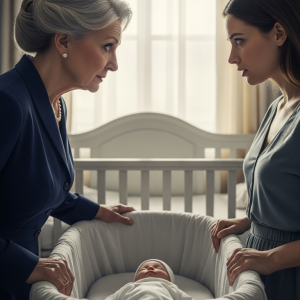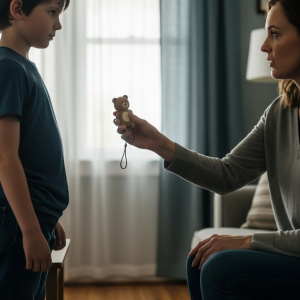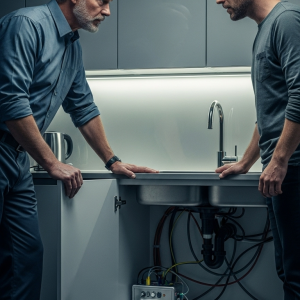The courtroom was cold, not from the air conditioning, but from the sterile silence that hung between pronouncements. Laura Evans felt each tick of the clock like a hammer blow against her ribs. She looked at her children, Olivia, sixteen, and Josh, twelve. Their faces were impassive, curated masks of indifference she no longer recognized.
Mark, her soon-to-be ex-husband, sat beside them, his hand resting on the shoulder of his pristine, impeccably dressed fiancée, Isabelle. Isabelle’s smile was a masterpiece of sympathetic concern, a carefully painted expression that didn’t quite reach her diamond-hard eyes. Laura had seen that look before, in the subtle, condescending remarks about her “modest” home or her “simple” clothes.
The judge cleared his throat, his gaze falling upon the children. “Olivia, Josh. The court has heard testimony from both your parents. Now, it needs to hear from you. In your own words, who do you wish to have primary custody?”
Olivia stood first, her posture unnaturally straight, her voice devoid of the warmth Laura cherished. “We choose to live with our father and Isabelle,” she said, the words precise and rehearsed.
Then came the blow that shattered what was left of Laura’s world. Olivia turned, her gaze finally meeting her mother’s.
“You’re a failure as a mother,” Olivia stated, her voice as sharp and cold as shattered glass. “You can’t give us anything. Not like they can.” Josh nodded in agreement, refusing to even look at her.
The words echoed in the cavernous room. A failure. After years of packed lunches, sleepless nights with sick children, art projects glued to the kitchen table, and cheering from the sidelines of every soccer game. It was all erased by the allure of a life she couldn’t provide—a life of Italian leather shoes and European vacations, whispered into their ears by Isabelle.
Mark wouldn’t meet her eyes. He just stared ahead, a man who had long ago chosen the path of least resistance. Laura looked at the papers the bailiff slid in front of her. Her hands didn’t shake. A strange, glacial calm settled over her. She signed her name, relinquishing her children, her life, her past.
She stood, smoothed down her simple dress, and walked out of the courtroom without a backward glance. There were no tears left to cry.
The drive home was a blur of traffic lights and gray asphalt. The silence in her car was a living thing, heavy and suffocating. Her small house, once filled with the chaotic symphony of her children’s lives, now felt like a tomb. The silence here was worse; it held the ghosts of laughter and arguments.
She walked through the rooms, a tourist in the ruins of her own life. Olivia’s half-finished canvas on an easel in the corner, a testament to a dream now deemed unworthy. Josh’s video game controller left on the sofa. Each object was a fresh stab of pain.
That night, Laura sat at her kitchen table, her laptop open. She scrolled through years of photos—beach trips, birthday parties, first days of school. With a deep breath, she moved the entire folder into the trash. It wasn’t about forgetting; it was about surviving.
Her fingers then moved to her phone. She found Mark’s contact, Isabelle’s, Olivia’s, Josh’s. One by one, she pressed ‘Block’. It was a brutal act of self-preservation, a tourniquet on a hemorrhaging wound. She was severing the limb to save the body. No more hopeful waiting for a text that would never come. No more torturing herself with their social media posts.
In the quiet that followed, a different part of her began to stir. Buried under years of domesticity was the woman she used to be—the sharp, ambitious coder who graduated top of her class, the woman who saw complex problems as elegant puzzles waiting to be solved. She had given it all up for Mark, for the family they were supposed to build together.
She found her old textbooks in a dusty box in the garage. The language of Python and C++ felt foreign at first, then comfortingly familiar. She started small, building a simple app to organize community volunteer events. The late nights were no longer filled with lonely despair but with the electric hum of creation. The frustration of debugging a line of code was a welcome challenge, a problem she could actually solve.
She called it ‘ConnectSphere’. It was a simple, elegant solution to a common problem. It started to gain traction locally, then regionally. An old college friend, now a venture capitalist, caught wind of it. He saw what she couldn’t yet see: the seed of an empire.
Six months later.
The view from the 30th-floor conference room was a panoramic sweep of the city skyline. The office was a testament to minimalist design—glass walls, sleek chrome, and the low, energetic buzz of a company on the rise. At the head of the long table stood Laura Evans, no longer a ghost in a silent house, but the CEO of ConnectSphere Inc.
She wore a tailored navy-blue suit, her posture radiating a confidence that was earned, not borrowed. Her presentation was flawless, her voice clear and compelling as she walked the investors through Q3 growth projections and expansion plans.
“Our user engagement is up 40% quarter-over-quarter,” she explained, gesturing to a dynamic chart on the screen. “We’re not just building a platform; we are building a community. Our next phase is integration with small businesses to create a symbiotic local economy. The potential is limitless.”
The investors, a notoriously tough crowd of Silicon Valley veterans, were visibly impressed. They saw a leader who knew her product, her market, and her mission. They saw a winner.
As they broke for a brief recess, Laura’s phone vibrated. It was a message from an old friend, a mother from her former neighborhood.
‘Laura, have you seen this? I’m so sorry. I thought you should know.’
Below the text was a link. Her finger hovered over it, a flicker of the old dread returning. With a steadying breath, she tapped it open.
The sprawling, modern mansion was a masterpiece of architecture and interior design. Every surface gleamed, every cushion was perfectly plumped. It was less a home and more a showroom, a backdrop for Isabelle’s carefully curated life. And Olivia felt like just another one of the props.
“That top is simply not appropriate for the gallery opening, Olivia,” Isabelle said, her voice dripping with faux sweetness as she glided into the room. She surveyed Olivia’s outfit—a stylish black top and jeans—with a look of profound disappointment. “We are presenting a united, elegant front. Go and change into the silk blouse I laid out for you.”
It was always like this. Her clothes, her friends (“Their families have no standing, darling”), her grades (“A- is not an A, is it?”), even her posture was subject to Isabelle’s relentless critique. Her father, Mark, was a silent bystander, his spine seemingly dissolved by the financial comfort Isabelle provided. He’d just offer a weak, apologetic shrug whenever Olivia looked to him for help.
The final battle had been over her future. Olivia’s portfolio had earned her an early admission interview at one of the top design schools in the country. She had been ecstatic, the first real spark of joy she’d felt in months.
Isabelle had extinguished it with a single, dismissive wave of her hand.
“Art school? Don’t be ridiculous,” she had scoffed over dinner. “An Evans does not waste her time on… hobbies. You will study business or law. Mark, tell her.”
Mark had mumbled something about “practical careers,” his eyes fixed on his plate.
When Olivia had dared to argue, to defend her dream, Isabelle’s mask of civility had finally slipped. “Your defiance is unbecoming,” Isabelle had hissed, her voice dropping to a venomous whisper. “If you cannot be molded into a respectable young woman here, then I will send you somewhere they specialize in it. There is an excellent finishing school in Switzerland. Very strict. Very isolated. It will correct these… artistic notions right out of you.”
The threat was real. Isabelle had already printed out the brochures. It wasn’t a school; it was a prison sentence. The life she had chosen, the life that had seemed so glamorous, had become a gilded cage, and the walls were closing in. Desperation was a physical ache in her chest. She needed her mom.
The Facebook page loaded. And there was her daughter’s face, a recent, professionally taken photo that Isabelle had no doubt commissioned. Olivia’s smile was painfully false. Above it, a headline in all caps.
FINDING MOM: LAURA EVANS.
Laura’s breath hitched. She read the post, her heart pounding against her ribs.
“If anyone knows where my mother is, please send me a message. Mom, if you’re reading this, I’m sorry. I was wrong. I really need you.”
It was a public plea, a desperate flare sent up from a sinking ship. Laura’s mind raced. Why now? Why like this? Had something happened? Was she hurt? The old maternal panic, the instinct she had fought so hard to suppress, surged within her.
She scrolled down, her thumb shaking, and the story began to unravel in the comments section. It wasn’t an anonymous troll; it was a comment from Sarah, Olivia’s best and oldest friend.
“Her family is not what it seems! The stepmother, Isabelle, is a monster. She’s trying to send Olivia to a boarding school in Europe to stop her from pursuing her dream. This isn’t just a post; it’s a cry for help! Olivia, I told you I’d do this if you didn’t have the guts. Your real mom needs to know!”
Other comments quickly followed. Classmates confirming Olivia had seemed miserable. Neighbors mentioning hushed arguments. The carefully constructed façade of the perfect family was crumbling for the entire world to see.
Laura stared at the screen, the words blurring together. The investors were filtering back into the conference room, their chatter a distant hum. She felt a thousand emotions at once: a pang of vindication, a surge of anger at Isabelle, and a deep, aching sorrow for the daughter who had been pushed to this public breaking point.
She instinctively reached for her phone’s keypad, her fingers ready to dial, to text, to respond. But they stopped.
She looked at her phone. It was silent.
For six months, this silence had been her tormentor. Every notification that wasn’t from them was a disappointment. Every unanswered holiday text was a fresh wound. She had yearned for this device to ring, to bring her children back to her.
Now, the silence meant something else entirely. It was a symbol of her freedom. She had blocked them. They couldn’t reach her. The only reason she knew of this crisis was through a third party. For the first time since the divorce, she wasn’t the one waiting by the phone. She wasn’t the one pleading for a moment of their time.
They were.
A profound, earth-shattering realization washed over her. For the first time in nearly two decades, she was the one holding all the cards. She was no longer the discarded wife, the failed mother, the woman left behind. She was a CEO, a founder, a self-made woman who had rebuilt her life from the ashes.
The decision to intervene—or not—was hers and hers alone. It would not be an act of desperate, pleading motherhood. It would be a choice, made from a position of absolute power.
In the sterile mansion, chaos reigned. Isabelle was pacing like a caged panther, her phone buzzing incessantly with calls from friends, reporters, and board members of the charities she chaired. Her perfect image was being publicly torched, and she was incandescent with rage.
“How could she do this to me?” she shrieked at Mark. “After everything I have given her! Ungrateful little brat! You have to fix this! Shut it down!”
Mark stood helpless, pale and trembling. He had tried calling Laura, but the calls wouldn’t go through. He had tried texting, but the messages were undelivered. He looked at his daughter, Olivia, who was huddled on the couch with Josh, both of them finally seeing the ugly truth of the life they had chosen. He had failed them. He had traded their happiness for his own comfort, and now he had lost their respect entirely.
Back in her high-rise office, Laura looked out at the city she was, in her own small way, conquering. She thought of the courtroom, of Olivia’s cold, cutting words. ‘You’re a failure.’
The irony was crushing. The luxurious life her children had chosen, the very thing they had thrown in her face, had become their prison. The “failure” of a mother had become their only hope for rescue.
The destruction was already complete, and she hadn’t had to lift a finger. Isabelle’s social standing was in flames. Mark’s authority as a father was nonexistent. Her children were facing the bitter consequences of a choice made with youthful greed and manipulated hearts.
Laura Evans looked at her silent phone, then back at the skyline. The investors were waiting. Her company was waiting. Her future was waiting.
She did not feel an immediate urge to call. For the first time, she felt the profound, quiet strength of a queen surveying her kingdom. Whether she chose to open the gates to her prodigal children was a decision she would make on her own terms. And that choice, whatever it might be, would be her final, most powerful victory.




